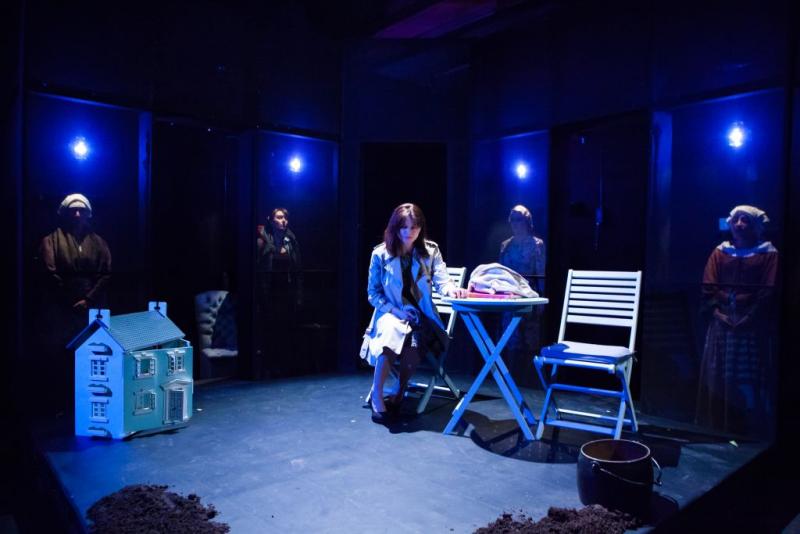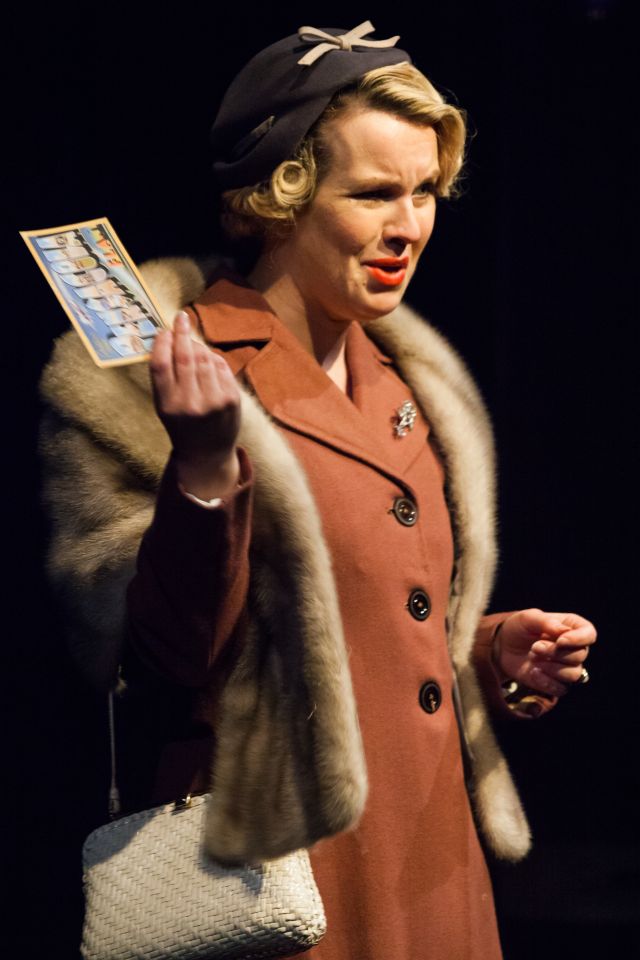World Enough and Time, Park Theatre | reviews, news & interviews
World Enough and Time, Park Theatre
World Enough and Time, Park Theatre
A play about feminism through the ages is better in concept than in execution

Performed by all-female theatre company, Fluff, Sarah Sigal's take on feminism through the ages drops us in and out of three time scenarios: the Royalist household of Lady Anne in 1646, the adventures of fashion journalist Pamela in 1936, and the discourse between corporate manager Celia and her recovering addict friend Lucy in 2014. Sound familiar in both structure and content? Well, if you follow the work of Caryl Churchill, it largely is.
The play's elliptical scenes and female-centric focus suggest Churchill's contemporary classic Top Girls, to which Sigal further adds an aspect not exactly coursing through her predecessor's1982 play: happiness. But as is rarely the case with Churchill, the concept here is better than the execution. Justin Audibert's direction allows a 2 hour 25-minute play to feel longer than it is, and the slide from century to century is noticeably clunky. That said, the writing does offer up some fantastically muscular characters, and Sigal – a Chicagoan now based in London – leaves us with plenty to chew over.
 The play begins with Lady Anne composing what she hopes will be a speech rousing enough to inspire the women in her village to resist Cromwell's army. Her servants are encouraging but the eldest among them, Meg, reveals her doubts in private: "We're livin' at the mercy 'a these folk," she tells her fellow maids. "We work their land 'n we're bound to 'em like slaves." Delivered by the chameleon-like Yvonne Riley, her thoughts poignantly reflect more contemporary discussion on the rich as the creators and facilitators of jobs. It's the pragmatic Meg who thinks that women should safeguard their families against a selfish king and so calls for an end to discussion of loyalty.
The play begins with Lady Anne composing what she hopes will be a speech rousing enough to inspire the women in her village to resist Cromwell's army. Her servants are encouraging but the eldest among them, Meg, reveals her doubts in private: "We're livin' at the mercy 'a these folk," she tells her fellow maids. "We work their land 'n we're bound to 'em like slaves." Delivered by the chameleon-like Yvonne Riley, her thoughts poignantly reflect more contemporary discussion on the rich as the creators and facilitators of jobs. It's the pragmatic Meg who thinks that women should safeguard their families against a selfish king and so calls for an end to discussion of loyalty.
The Civil War-era scenes, particularly the ones featuring Riley, are strongest and leave us wanting more. By contrast, those set in 2014 and focusing on the suited and booted Celia (played by Jess Murphy, pictured above, who also plays Lady Anne) are oversimplified. Privately educated Celia has landed in the corporate world from where she happily tells her jobless friend Lucy that women should stop whinging and "get their noses to the grindstone". Her narrow arguments exemplify the exclusivity of contemporary, capitalist feminism in the West. "I think feminism is too sharp a term," says Celia at one point. "It's become too loaded, too hostile. Alienating." But in fact it's her version of feminist success that is so horrifyingly sharp and leaves her little time to savour her achievements: "It isn't about being happy! You have to be willing to make sacrifices."
 Pamela, by contrast, lives a whirlwind of excitement and controversy in 1936. The country is contemplating Hitler's policies and Prince Edward's relationship with Wallis Simpson is hotly debated. Pamela brings much-needed comic relief and is played to light-hearted perfection by Rebecca Dunn (pictured left). Through her clipped accent and witty observations, she reveals a woman on a steep learning curve gathering information about Germany and the influential role of women in the male-dominated political landscape.
Pamela, by contrast, lives a whirlwind of excitement and controversy in 1936. The country is contemplating Hitler's policies and Prince Edward's relationship with Wallis Simpson is hotly debated. Pamela brings much-needed comic relief and is played to light-hearted perfection by Rebecca Dunn (pictured left). Through her clipped accent and witty observations, she reveals a woman on a steep learning curve gathering information about Germany and the influential role of women in the male-dominated political landscape.
Unlike Celia, Pamela's world is about to open up, and this is what Sigal wants for her audience. Her aim here is to get us to consider the obvious branches of feminisms (yes, plural) that have always existed and which ones are most effective in both culture and politics.
Although the production has its tiresome aspects and the images of men in it seem like an afterthought, the writing and the concept are refreshingly to the point. And if you have been here before, well, is that necessarily a bad thing?
rating
Share this article
The future of Arts Journalism
You can stop theartsdesk.com closing!
We urgently need financing to survive. Our fundraising drive has thus far raised £49,000 but we need to reach £100,000 or we will be forced to close. Please contribute here: https://gofund.me/c3f6033d
And if you can forward this information to anyone who might assist, we’d be grateful.

Subscribe to theartsdesk.com
Thank you for continuing to read our work on theartsdesk.com. For unlimited access to every article in its entirety, including our archive of more than 15,000 pieces, we're asking for £5 per month or £40 per year. We feel it's a very good deal, and hope you do too.
To take a subscription now simply click here.
And if you're looking for that extra gift for a friend or family member, why not treat them to a theartsdesk.com gift subscription?
more Theatre
 Little Brother, Soho Theatre review - light, bright but emotionally true
This Verity Bargate Award-winning dramedy is entertaining as well as thought provoking
Little Brother, Soho Theatre review - light, bright but emotionally true
This Verity Bargate Award-winning dramedy is entertaining as well as thought provoking
 The Unbelievers, Royal Court Theatre - grimly compelling, powerfully performed
Nick Payne's new play is amongst his best
The Unbelievers, Royal Court Theatre - grimly compelling, powerfully performed
Nick Payne's new play is amongst his best
 The Maids, Donmar Warehouse review - vibrant cast lost in a spectacular-looking fever dream
Kip Williams revises Genet, with little gained in the update except eye-popping visuals
The Maids, Donmar Warehouse review - vibrant cast lost in a spectacular-looking fever dream
Kip Williams revises Genet, with little gained in the update except eye-popping visuals
 Ragdoll, Jermyn Street Theatre review - compelling and emotionally truthful
Katherine Moar returns with a Patty Hearst-inspired follow up to her debut hit 'Farm Hall'
Ragdoll, Jermyn Street Theatre review - compelling and emotionally truthful
Katherine Moar returns with a Patty Hearst-inspired follow up to her debut hit 'Farm Hall'
 Troilus and Cressida, Globe Theatre review - a 'problem play' with added problems
Raucous and carnivalesque, but also ugly and incomprehensible
Troilus and Cressida, Globe Theatre review - a 'problem play' with added problems
Raucous and carnivalesque, but also ugly and incomprehensible
 Clarkston, Trafalgar Theatre review - two lads on a road to nowhere
Netflix star, Joe Locke, is the selling point of a production that needs one
Clarkston, Trafalgar Theatre review - two lads on a road to nowhere
Netflix star, Joe Locke, is the selling point of a production that needs one
 Ghost Stories, Peacock Theatre review - spirited staging but short on scares
Impressive spectacle saves an ageing show in an unsuitable venue
Ghost Stories, Peacock Theatre review - spirited staging but short on scares
Impressive spectacle saves an ageing show in an unsuitable venue
 Hamlet, National Theatre review - turning tragedy to comedy is no joke
Hiran Abeyeskera’s childlike prince falls flat in a mixed production
Hamlet, National Theatre review - turning tragedy to comedy is no joke
Hiran Abeyeskera’s childlike prince falls flat in a mixed production
 Rohtko, Barbican review - postmodern meditation on fake and authentic art is less than the sum of its parts
Łukasz Twarkowski's production dazzles without illuminating
Rohtko, Barbican review - postmodern meditation on fake and authentic art is less than the sum of its parts
Łukasz Twarkowski's production dazzles without illuminating
 Lee, Park Theatre review - Lee Krasner looks back on her life as an artist
Informative and interesting, the play's format limits its potential
Lee, Park Theatre review - Lee Krasner looks back on her life as an artist
Informative and interesting, the play's format limits its potential
 Measure for Measure, RSC, Stratford review - 'problem play' has no problem with relevance
Shakespeare, in this adaptation, is at his most perceptive
Measure for Measure, RSC, Stratford review - 'problem play' has no problem with relevance
Shakespeare, in this adaptation, is at his most perceptive
 The Importance of Being Earnest, Noël Coward Theatre review - dazzling and delightful queer fest
West End transfer of National Theatre hit stars Stephen Fry and Olly Alexander
The Importance of Being Earnest, Noël Coward Theatre review - dazzling and delightful queer fest
West End transfer of National Theatre hit stars Stephen Fry and Olly Alexander

Add comment